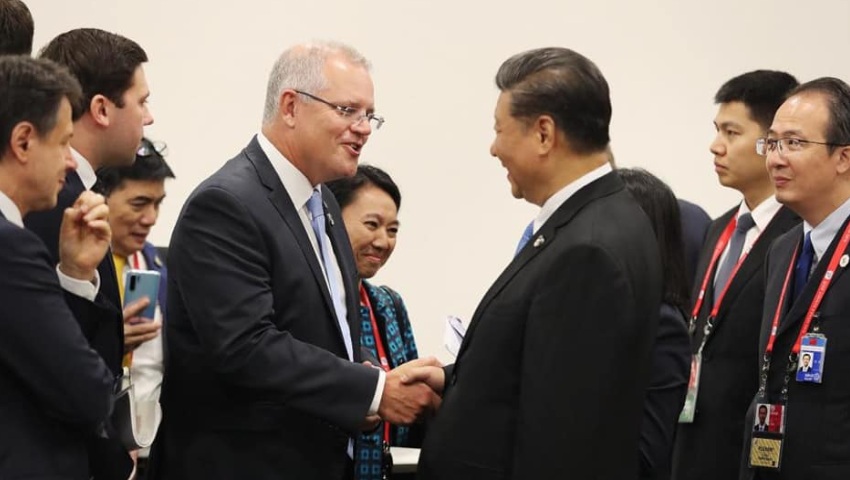The retiring secretary of the Department of Foreign Affairs and Trade (DFAT), Frances Adamson, said in a noteworthy speech at the National Press Club that China was “a great power that is still dogged by insecurity as much as driven by ambition, that it has a deeply defensive mindset perceiving external threats even as it pushes its interests over those of others. It is too ready to suspect containment instead of judging issues on their individual merits”.
To continue reading the rest of this article, please log in.
Create free account to get unlimited news articles and more!
She went on: “This siege mentality, this unwillingness to countenance scrutiny and genuine discussion of differences serves no one’s interest. What we tell the Chinese government is we are not interested in promoting containment or regime change.”
The future governor of South Australia concluded that it might take some considerable time before relations between Australia and China improved and would only occur when China takes a pragmatic view that its own interests would be better served by a different approach.
This may well be occurring with President Xi Jinping recently told senior Communist Party officials it was important to present an image of a "credible, loveable and respectable China" (BBC report).
However, we also need to look at our own way forward. So much of our current animated public discussion is about Australia’s trading relationship with China vis a vis our security relationship with the US and other allies and security partners. There seems to be a new book on China from a noted author every month, and they cover the full spectrum of views from downplaying the Chinese threat to Australia’s sovereignty to urging the preparation for a future conflict.
Within this wide-spectrum debate is invariably included the plight of the Muslim Uighurs from China’s far western region, the suppression of the rule of law in Hong Kong and the militarisation of the South China Sea.
The seemingly inevitable Chinese invasion of Taiwan is frequently posed as a flashpoint that will occur within the next decade. Conversely, industrial leaders and some political leaders are concerned that Australia’s economic dependence on Chinese trade should temper our stance.
Another useful commentary was provided by another former DFAT secretary Peter Varghese, now chancellor of the University of Queensland, who wrote in the AFR last week — “China’s seeking client states, not ideological conquests” — that we must regard China as "a one-party Leninist state led by a party committed to its retention of monopoly political power", and to strategic competition with the US. That contest will affect the world, but we are not a participant as such.
Varghese goes on to say: “In China and Australia, domestic compulsions are playing a large role in the execution of foreign policy … Australia cannot change China’s calculations, but we can do more to set out how we see China, where we differ, and where we can work together.”
Examples that immediately arise over the coming decade might include:
- On climate change we could begin a bilateral dialogue on the application of renewable energy to complement and ultimately replace fossil fuels;
- China could teach us a lot about high-speed rail technology with their network being the world’s largest;
- A more collaborative approach to the Belt and Road Initiative and its recent G7 equivalent to benefit third-party countries in need of development aid and pandemic assistance;
- A closer collaboration on merchant shipping construction, operation and sustainment;
- Agricultural research and development to optimise production and minimise greenhouse gas emissions and marine pollution;
- Fishing and aquaculture practices throughout the Indo-Pacific region;
- Collaboration within the Antarctic continent; and
- Ultimately the development and deployment of small modular nuclear reactors.
Viewed from the current hostility between Australia and China, these proposed areas of co-operation may seem far-fetched, but if we are to progress we need to start from acceptance of fundamental differences that won’t change over the next decade and then find areas where there is common interest and find a way to collaborate, if necessary via a third-party interlocutor such as New Zealand.
This does not mean that Australia’s national security would be compromised. Defence and diplomacy will be increasingly important. China will continue to attempt to undermine and obstruct the lives of democracies.
In conclusion, we should heed Varghese’s wise words: “China must be both engaged and constrained. It cannot be ignored. It cannot be decoupled from the global economy. Nor can it be excluded from the search for solutions to the big global challenges such as climate change, pandemics and the proliferation of nuclear weapons.”
Christopher Skinner served 30 years in the Australian Navy as a weapons and electrical engineer officer in six surface warships, including all three of the previous guided missile destroyers. He was seconded to the US Naval Sea Systems Command to manage the trials of the USS Oliver Hazard Perry FFG-7 first of class, and was the initial project director for the RAN Anzac Frigate Program. His interest in nuclear power for submarines is more recent and is reflected in his membership of the Engineers Australia, Sydney Division Nuclear Engineering Panel, the Australian Nuclear Association and the American Nuclear Society. He is also associated with several other organisations and institutes engaged in geopolitics, technology and submarine matters.
The views expressed above are entirely those of the author and are not endorsed by any of the organisations of which he is a member.

 Login
Login







